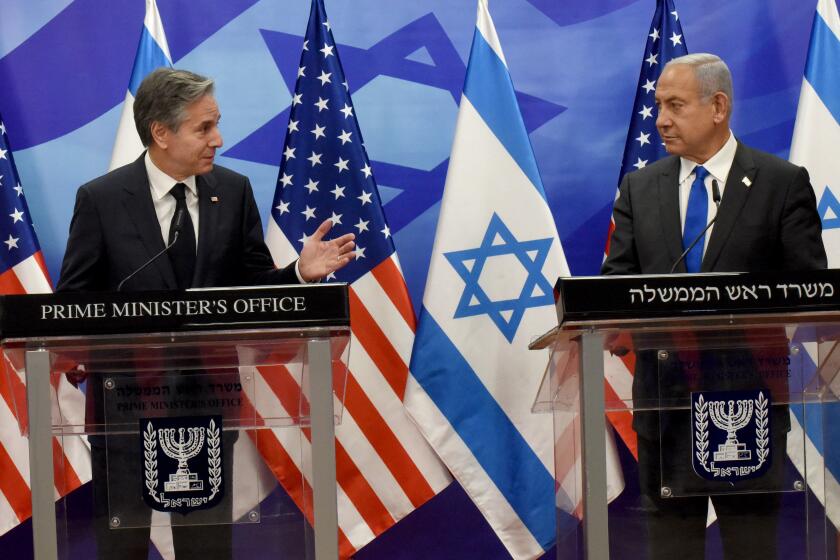Column: Why Israel is losing me

- Share via
For many years I believed the Israeli-Palestinian conflict was fixable, that a final resolution could — and ultimately would — be found in the creation of two independent, sovereign states. I thought it was, all in all, the fairest but also the most pragmatic solution, and that both sides would make it happen, sooner rather than later, despite the obvious obstacles.
I no longer believe that. I no longer have faith in good intentions or even the power of pragmatism. The blows to my faith have been inflicted over the years by both sides, but most recently by Israel, which has become an unrecognizable country as it has moved steadily rightward.
The new government in Israel under Benjamin Netanyahu, already the country’s longest-serving prime minister, is provocative, belligerent and beyond the pale.
It is the most right-wing, illiberal government in Israeli history.
Opinion Columnist
Nicholas Goldberg
Nicholas Goldberg served 11 years as editor of the editorial page and is a former editor of the Op-Ed page and Sunday Opinion section.
The new coalition’s proposal to weaken the judiciary, which is moving forward in the Knesset, drove 100,000 protesters into the streets last week and poses a serious threat to Israeli democracy. But that’s only part of the problem. Israel is also engaged in ongoing actions targeting human rights groups and other NGOs, whittling away at free speech and marginalizing its Arab population.
The Palestinians who live in Israel have always been treated as second-class citizens, and that continues. As for the treatment of Palestinians in the occupied West Bank, let’s just say I was dismayed but not surprised when Human Rights Watch in 2021 declared it abusive and discriminatory, and said it met the legal definition of “apartheid.”
But the new government threatens to take all that to a new level. It includes ultranationalists who hope to annex the West Bank entirely, rather than work toward peace. It includes theocrats who want Judaism to guide the state, not secular law and individual rights.
Itamar Ben Gvir, the new cabinet minister for national security, was barred from serving in the army because of his extremism and was convicted of “racist incitement” and “supporting a terrorist group.” Finance Minister Bezalel Smotrich, who once said it was a mistake that Israel didn’t expel more Arabs when it was founded, believes the land of Israel — including the occupied territories — was promised to the Jews by God. He’s not alone in that belief.
The U.S. is so far empty-handed in dealing with Israel’s radical government and dysfunctional Palestinian leadership.
Netanyahu has made extraordinary deals with these extremists to remain in power and, according to some, to avoid or delay his corruption trial on bribery and fraud charges.
If I’m the kind of American Jew Israel hopes to keep on its side, it’s not doing a great job. Frankly, the idea of billions of dollars in American aid being dispatched to Israel each year offends me given that it won’t live by basic rules of international law, preserve its democratic rules and institutions or drag itself to the table to work out a good-faith resolution to the century-old conflict with the Palestinians.
I’m not a newcomer to this subject. I lived in Jerusalem as a correspondent, spending time with West Bank settlers, right-wing Likudniks, leftist legislators and activists and ultra-orthodox Haredim. I covered many deadly terror attacks, sometimes arriving when the bodies were still on the ground. I covered Prime Minister Yitzhak Rabin’s assassination and interviewed Netanyahu several times after he became prime minister in 1996.
I also spent time with Palestinians whose homes had been demolished by Israeli army. I crossed the checkpoints with Palestinian workers, wandered the refugee camps of Gaza and the villages of West Bank, talked to Hamas leaders and asked questions of Palestinian Authority President Yasser Arafat.
Thousands of Israelis protest outside of parliament ahead of a vote on a bill that would give politicians greater power over appointing judges.
At that time, many people on both sides believed that peace was on its way — despite the bombings, assassinations and bitter rejectionism.
But we were naive. Today, most believe that the creation of two separate states is simply not going to happen in the foreseeable future, if ever. Instead, the harsh, unjust and illegal occupation of Palestinian territory, which has now lasted for 56 years, will continue indefinitely.
That can’t be attributed entirely to the new government’s belligerence. Over many years, Israel has allowed more than 450,000 settlers to establish communities in the occupied West Bank (and many more in East Jerusalem), making a territorially contiguous Palestinian state almost inconceivable. A poll released last month showed that the two-state solution is now supported by only about a third of Israeli Jews and a third of Palestinians, the lowest levels since the early 1990s. There have been no serious peace talks for years.
But this government will make matters worse, and more volatile. Already, violence is rising again; some experts predict a third intifada.
Tens of thousands of Israelis have poured into the streets each weekend to protest changes Netanyahu and his coalition are planning that opponents believe will curtail civil liberties.
If, in some small, remote corner of my brain, I haven’t absolutely given up hoping that the possibility of two states might be brought back from the dead — perhaps in 10, 25 or 50 years — it’s only because I don’t see a workable alternative.
But I expect no progress for a long, long time.
I don’t mean to suggest that Israel doesn’t have the right to insist vehemently on reasonable protections for its security. Nor do I mean to absolve the Palestinians of all blame for the conflict. They’ve blown their share of opportunities. The terror attacks against civilians undertaken by Hamas and other militant groups are ruthless and heartbreaking. The Palestinian Authority under Mahmoud Abbas has done an awful job of representing its people effectively.
But at the moment, it’s Israel that has me despondent. Frankly, I can’t just go on wishing fruitlessly for a peace that has, year after year, seemed farther and farther away, and which this new Israeli government, which voices such detestable bigotry and hatred, clearly has no interest in pursuing.
More to Read
A cure for the common opinion
Get thought-provoking perspectives with our weekly newsletter.
You may occasionally receive promotional content from the Los Angeles Times.















